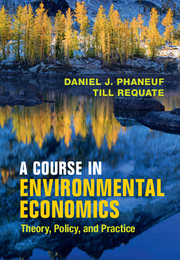Book contents
- Frontmatter
- Dedication
- Contents
- Figures
- Tables
- Preface
- Notational Conventions
- PART I ECONOMICS AND THE ENVIRONMENT
- PART II THE DESIGN OF ENVIRONMENTAL POLICY
- PART III VALUING THE ENVIRONMENT
- 14 Theory of Applied Welfare Analysis
- 15 Revealed Preference Models
- 16 Discrete Choice Models
- 17 Recreation
- 18 Property Value Models
- 19 Stated Preference Methods
- 20 Health Valuation
- PART IV THE PRACTICE OF ENVIRONMENTAL ECONOMICS
- References
- Author Index
- Subject Index
18 - Property Value Models
from PART III - VALUING THE ENVIRONMENT
Published online by Cambridge University Press: 27 February 2023
- Frontmatter
- Dedication
- Contents
- Figures
- Tables
- Preface
- Notational Conventions
- PART I ECONOMICS AND THE ENVIRONMENT
- PART II THE DESIGN OF ENVIRONMENTAL POLICY
- PART III VALUING THE ENVIRONMENT
- 14 Theory of Applied Welfare Analysis
- 15 Revealed Preference Models
- 16 Discrete Choice Models
- 17 Recreation
- 18 Property Value Models
- 19 Stated Preference Methods
- 20 Health Valuation
- PART IV THE PRACTICE OF ENVIRONMENTAL ECONOMICS
- References
- Author Index
- Subject Index
Summary
As described in previous chapters, the fundamental challenge of environmental valuation stems from the fact that environmental amenities are not, in general, exchanged in markets. With no directly observed transactions available to infer value, revealed preference analysis relies on observation of behavior in a related private good market, coupled with assumptions on how the environmental and private good are related. One example of this is when the environmental good is assumed to be a component of a bundled or quality-differentiated market good, in which the attributes of the good (including the environmental attribute) determine its price. By choosing a particular bundle to purchase, individuals indirectly choose – and pay for – a given level of the environmental good. In these cases the hedonic or discrete choice models for quality-differentiated market goods apply, and observation of sales for the differentiated good can in principle be used to infer the value of the environmental good. In environmental economics one of the most common applications of these models is to property values. In this chapter we discuss specific modeling and econometric approaches for using property values to measure environmental values.
In several respects, real estate markets provide an ideal circumstance for measuring environmental value from market behavior. In urban areas real estate markets are usually competitive with a large flow of transactions, and the notion that property prices should reflect attributes of the location and structure is intuitive and non-controversial. Property purchases are sizeable investments that condition many other aspects of life for long periods of time, and so market participants are likely to be well informed about the many attributes that affect home prices and the services a home provides. This can include local environmental conditions. For example, nearby landscape amenities such as nature trails often attract buyers, while others may try to avoid living near contaminated industrial sites. Thus residential home purchases are a promising window through which to view households’ environmental preferences. There are, however, challenges and limitations to be recognized and overcome. First, the scope of public and environmental goods that can be valued via housing markets is limited by geography and information. Only local amenities that vary across the landscape and are observed by consumers will influence housing prices.
- Type
- Chapter
- Information
- A Course in Environmental EconomicsTheory, Policy, and Practice, pp. 529 - 571Publisher: Cambridge University PressPrint publication year: 2016



